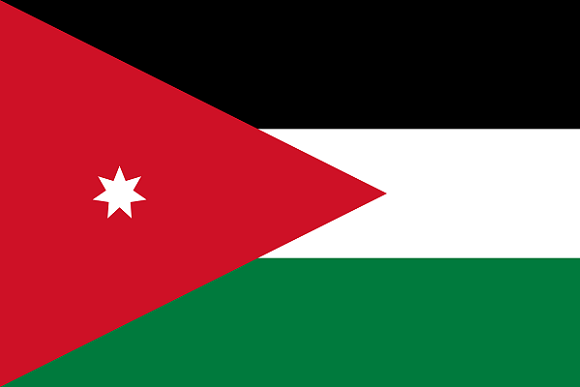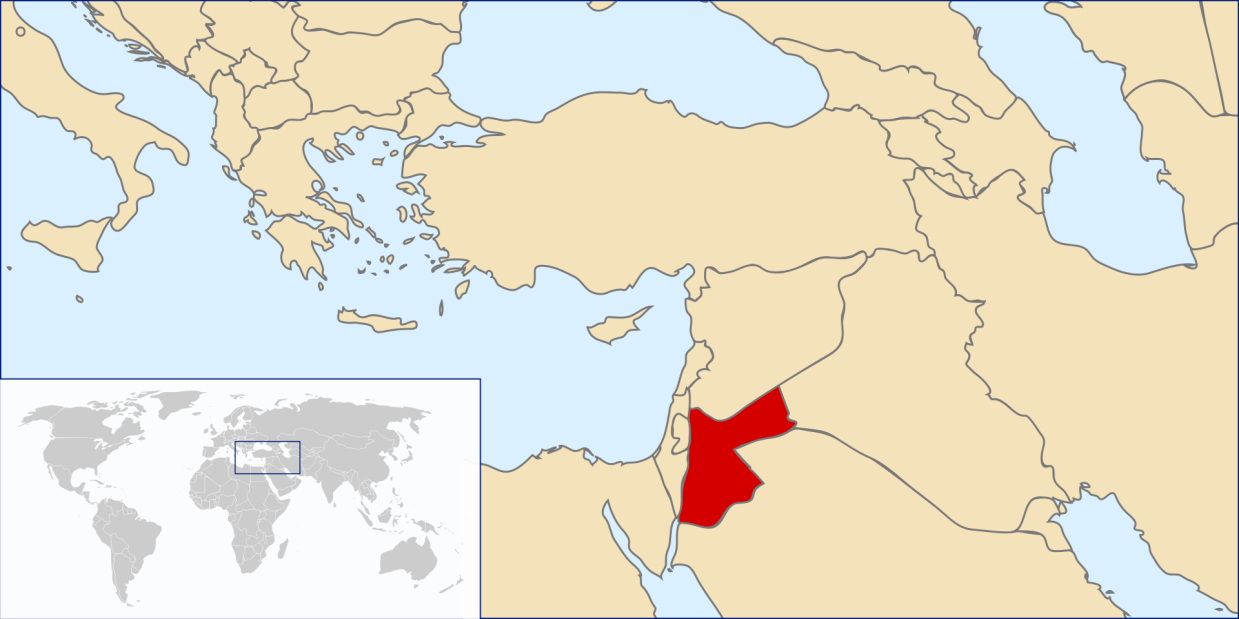
Geography

Source: This image is the intellectual property of Rei-artur. Redistribution under licence CC BY-SA 3.0
Area: 89,342 km2 (0,60% water)
Coastline: 26 km
Terrain: Highlands and valley to the west, desert plateau to the east
Highest point: Jabal Umm ad Dami 1,854 m (on the border with Saudi Arabia)
Climate: Mainly desert, rainy season in west Jordan between November – April
Geographical population distribution: Over 95% of the population lives in the western half of the country, mainly in the northwest
Natural resources: phosphate, potassium carbonate, shale oil
Demographics
Population: ~11,340,000 (2025)
Annual population growth: ~0.5 % (2025)
Estimated population in 2025: ~11,340,000
Age structure (2025)
0‑14 years – ~26 %
15‑64 years – ~69 %
65+ years – ~5 %
Total fertility rate: ~2.5 children per woman (2025)
Birth rate: ~20 per 1,000 population (2025)
Death rate: ~4.1 per 1,000 population (2025)
Median age: ~24.6 years (2025)
Life expectancy at birth: ~75.4 years (2025)
Males – ~73.6 years
Females – ~77.2 years
Net migration rate: Approximately −30,000 to −156,000 people per year (2025 est.)
Languages: Arabic (official), widely used English and others
Religious groups: Predominantly Sunni Muslim (>90 %), Christians and other minorities (based on older data)
Ethnic groups: Majority Arabs with small minority groups (based on older data)
Economy
GDP: $43.70 bil (2020) GDP per capita: $4,282.80 (2020) GDP annual growth rate: -1.6% (2020) Public debt (% GDP): 94.59% (2019) Inflation (CPI): 0.3% (2020) Unemployment: 18.5% (2020) Imports: $19.3 bil (2019)5 largest import partners (% total imports 2019): Saudi Arabia 16.07%, China 15.96%, United States 8.27%, Turkey 4.56%, India 4.46%
Exports: $8.3 bil(2019)
5 largest export partners (% total exports 2019): United States 23.66%, Free Zones 11.98%, Saudi Arabia 10.15%, India 8.44%, Iraq 7.64%
60.9/100 (2019 – position 70/141)
Index of Economic Freedom (Heritage Foundation)
64.6/100 (2021 – position 69/180)
Income Inequality Index (Gini – World Bank)
35.4% (2013)
Prosperity Index (Legatum Institute)
56.41/100 (2021 – position 81/167)
Military Power
Active personnel: 90,000Army: 77,000
Navy: 500
Airforce: 12,500
Gendarmerie Forces: 15,000 (2021)
Defence expenditure(%GDP): 5.0% (2018)Politics and Government
Form of government: Constitutional monarchyKing: King Abdullah II (since 1999)
Prime Minister: Jaafar Hassan (appointed September 2024)
Legislative branch: Legislative power is shared between the Parliament and the King. The 5 members of the Senate (upper house) are appointed by the King for a 4-year term. The House of Representatives (lower house) is comprised of 130 members, of which the 115 are elected directly by the citizens for a 4-year term. The remaining 15 seats are reserved for women. For a law to be implemented, it must be initiated by the House of Representatives, approved by both chambers of the Parliament and ratified by the King.
Judicial branch: The judiciary is organized in civil, religious and special courts. The judges of civil and religious courts are appointed by the King. Civil courts deal with civil and criminal cases while religious courts deal with conflict resolution concerning personal matters based on religious law. Special courts are comprised of military and administrative courts. The head of the Senate is the president of the High Tribunal which, among others, is responsible for reviewing the constitution if requested to do so. The president of the highest civil court is the head of the Special Tribunal.
Parliamentary parties: (seats): ): Islamic Action Front (10), Zamzam (5), Islamic Centre Party (5), National Current (4), Justice and Reform Party (2), Civil Alliance (1), Arab Socialist Ba’ath (1), Communist Party (1), National Union (1), Al-Awn (1), Independent (99)
Next elections: Parliamentary elections in November 2024
Rule of Law - Human Rights
Corruption Perceptions Index(Transparency International)49/100 (2020 - position 60/180) Rule of Law Index Rule of Law Index
0.57/1 (2020 - position 50/129) Global Terrorism Index (Institute for Economics & Peace)
3.091/10 (2019 – position 64/163) Fragile States Index (Fund For Peace)
76.8/120 (2021 – position 67/179) Democracy Index (Economist Intelligence Unit)
3.62/10 (2020 – position 118/167) Press Freedom Index (Reporters Without Borders)
42.89/100 (2021 – position 129/180) Freedom in the World Index (Freedom House)
34/100 (2021)
Sources
United Nations (UN – Population Division, UNdata, UNcomtrade), World Bank, Federal Reserve Economic Data (FRED – St. Louis Fed), International Institute for Democracy and Electoral Assistance (International IDEA), Composition of Religious and Ethnic Group Project (CREG – Cline Center for Advanced Social Research, University of Illinois), Association of Religion Data Archives (ARDA), British Broadcasting Corporation (BBC), International Institute of Strategic Studies (IISS – Military Balance), Independent Election Commission (of Jordan), Konrad-Adenauer-Stiftung (KAS), Inter-Parliamentary Union (IPU), NationMasterSelected Articles
PopulationStat (2025), Jordan population & projections
GeoDatos.net (2025), Jordan population overview
PopulationPyramid.net (2025), Jordan age structure 2025
HPC (2025), Jordan Demographic Indicators Sheet April 2025 – Life expectancy figures
Al Jazeera (2024), Appointment of Prime Minister Jaafar Hassan by King Abdullah II
Arab News (2024), Appointment of Prime Minister Jaafar Hassan by King Abdullah II
Times of Israel (2024), Appointment of Prime Minister Jaafar Hassan by King Abdullah II




